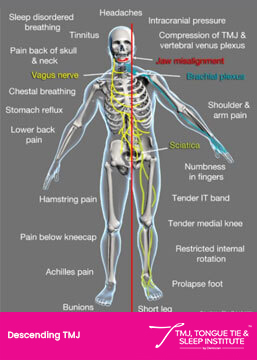IS MY ANXIETY, STRESS & TIREDNESS LINKED WITH MY TMJ DISORDER? Written By: Dr. Ankita Shah, 15 October 2023

TMJ/TMJD can have an effect on all parts of your life. Is there a link between stress, anxiety, exhaustion and TMJ? Yes! They could all be linked. They have similar symptoms causing them to frequently be wrongly diagnosed. For patients experiencing any of these, it’s important to understand how the link exists between them.
Stress and anxiety can be acute or chronic and it is your body’s natural way of reacting to difficult situations. Unfortunately, the struggles of living with TMJ disorder can also cause stress and anxiety, so it’s important to find ways to manage both in order to break the feedback loop and maintain a calm, clear mind to relieve muscle tension in the body.
We tend to hold emotions in our jaws. When I ask patients about clenching or grinding , they all automatically relate it to stress. When we are feeling stressed, we naturally tend to direct tension to our jaws. The muscles surrounding your head, neck and shoulders tend to hold tension related to stress holding patterns all of which can contribute to pain in your jaw.
Don’t let TMJ disorder impact your mental and physical well-being. Let the expert provide you with the care you need to address the underlying causes of these issues. Schedule a consultation today to learn more about how we can help you achieve optimal oral function and overall health.
Common symptoms of Stress include:
What science has shown is that the redirected tension actually releases the “feel good” hormone, also known as oxytocin. This hormone plays another major role, reducing cortisol levels (“fight or flight” hormone) and reducing inflammation in the vagus nerve. The vagus nerve runs from the brain down to the stomach and touches (almost) every major organ along the way. The point is not to encourage clenching in order to release oxytocin.
When compensation such as clenching occurs, the body reverts to that reaction automatically, without even recognizing it. Over time, the muscles reach compensation burnout and have to be treated.

Do you have a TMJ Disorder?
Symptoms include migraines, neck & back pain, jaw pain, snoring and sleep apnea. TMJ symptoms may rapidly advance hence it is best to treat it when the damage to the joint is reversible and the treatment, non-invasive.
Non Invasive Approaches To Treat Stress, Anxiety And TMJ/ TMJD
Studies show that noninvasive methods of addressing the causes and symptoms of TMJ are very effective. In fact, over 85 percent of patients will never develop chronic TMJ disorder. Those who find that stress or anxiety contribute to their TMJ have many different options at their disposal, such as:
1) Relax the Jaw Muscles (Massage)
Headaches and jaw pain are often a sign of TMJ disorder and treatment often depends on how severe your case is. Myofascial pain and TMD pain can respond very quickly to precise manipulation using our specialised Functional Neuro Myofascial Massage Technique and Low Level Laser Therapy (LLLT).
2) Myofunctional Therapy
Research says OMT has a significant reduction of pain sensitivity to palpations for all muscles and increased the mandibular range of motion and reduced frequency and severity of signs and symptoms of TMD. With orofacial myofunctional therapy, the main goal is to establish nasal breathing and correct oral posture by toning and repatterning the head, face, tongue and neck muscles.
3) Meditation, yoga and deep breathing techniques
Stress management and relaxation techniques are used to reduce the emotions we hold in our head, neck and face. If high-stress situations or anxiety cause you to tense up or brux, learning how to use relaxation exercises and deep breathing to calm your mind and your body. This can help your body change from a fight and flight mode i.e a high sympathetic drive to a parasympathetic drive.
4) TMJ Dental Orthotic
An orthotic device is a customised splint that can ease your jaw into a more comfortable and less straining TMJ position.
If you are living with TMD pain, remember you are not the only one.Doing the least invasive treatment first is always best.
Please feel free to ask us any questions. You can always contact us for questions or to schedule a consultation.
Keywords : anxiety, stress, depression, tiredness, fatigue, insomnia, sleepless nights, TMJ
